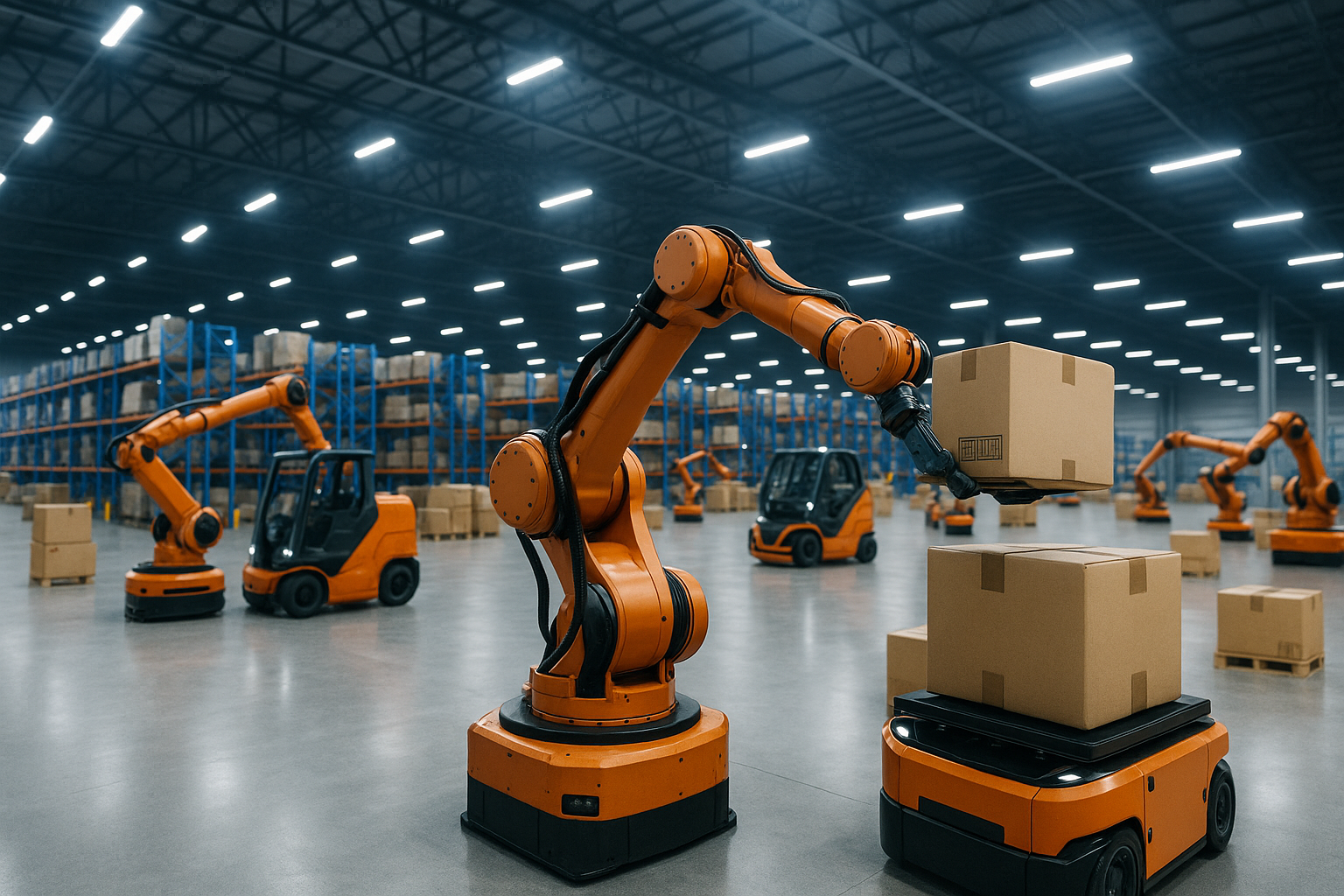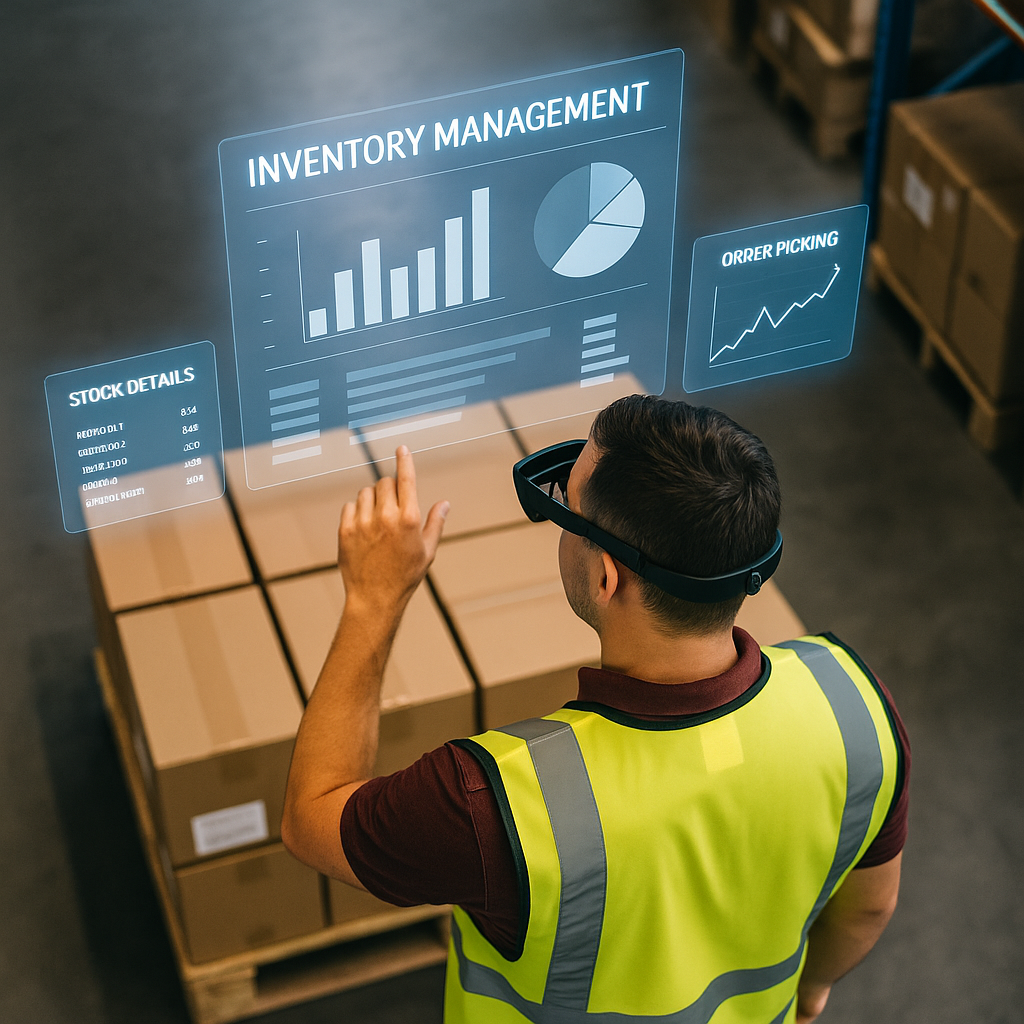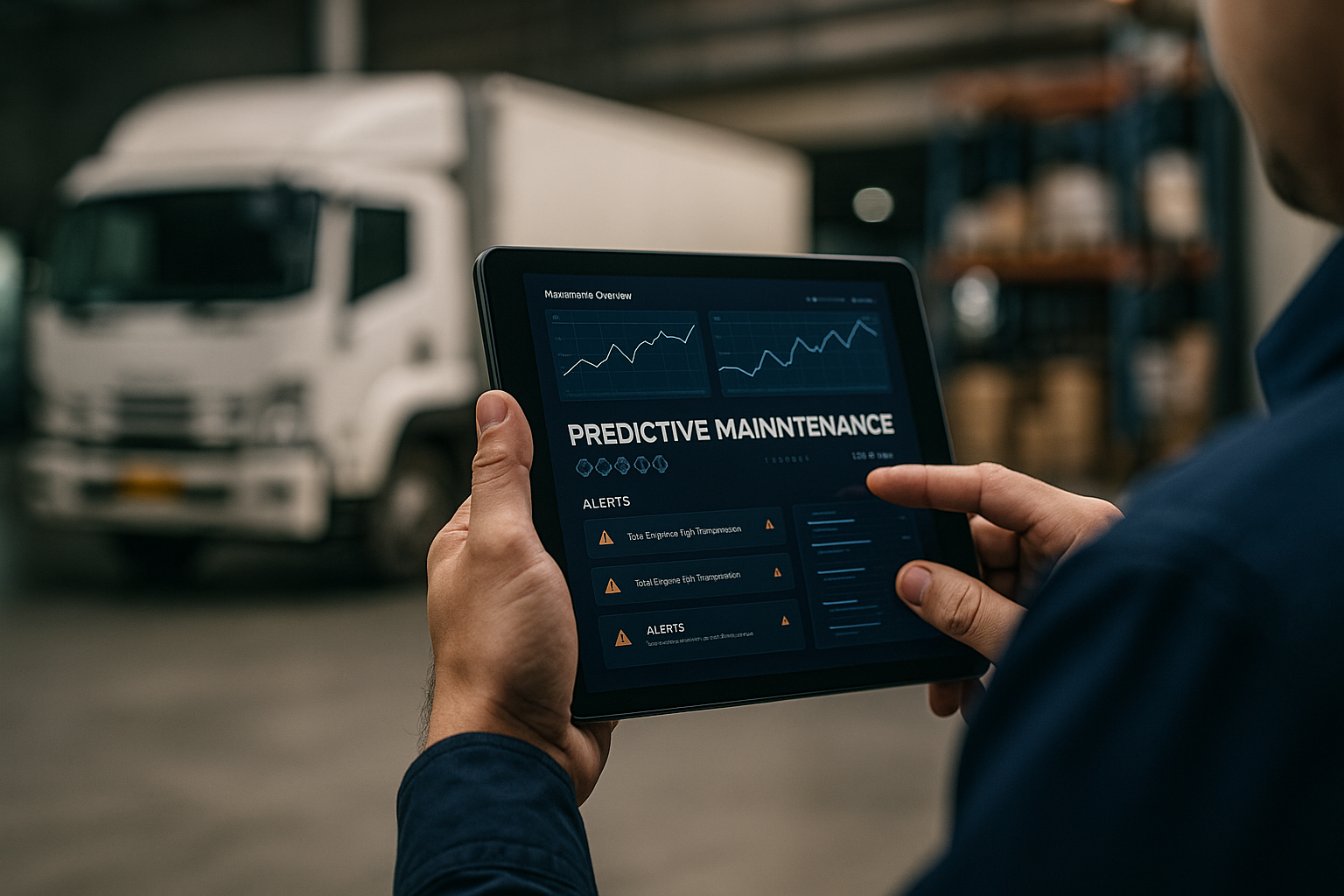Artificial Intelligence (AI) is reshaping industries across the globe, and the logistics sector is no exception.
From optimising delivery routes to enhancing inventory management and reducing operational costs, logistics AI has become a driving force behind smarter and more efficient logistics processes.
This blog explains the profound impact of AI on the logistics industry, highlighting the benefits, applications, challenges, and future possibilities transforming the logistics landscape.
Let’s uncover how AI revolutionises how businesses manage their supply chains and deliver exceptional customer experiences.

Let's Get Straight to the Point
Logistics AI transforms logistics by optimising routes, managing inventory, and reducing costs. Industry leaders like Amazon and FedEx leverage AI for automation and predictive analytics.
Despite challenges like integration costs, AI enables smarter, faster, and more sustainable supply chains, enhancing efficiency and customer satisfaction.
Understanding AI in Logistics
What is AI and its Applications in Logistics
Logistics AI technology enables machines to learn from experiences and perform tasks without human intervention. In the logistics industry, artificial intelligence is increasingly utilised to automate inventory management, route optimisation, and order processing tasks.
AI-driven tools enhance logistics operations by streamlining supply chain management and improving efficiency. By leveraging AI, businesses can identify patterns, predict outcomes, and make data-driven decisions faster.
AI technology improves companies' performance and substantially reduces costs, transforming the logistics landscape and allowing businesses to remain competitive. Companies benefit from enhanced flexibility, as AI systems can adapt seamlessly to fluctuating demands and operational changes.
AI improves the efficiency of logistics processes and plays a pivotal role in fostering sustainability. By optimising operations and reducing waste, businesses contribute to a greener future while maintaining high service standards. Integrating AI into logistics represents a paradigm shift, enabling smarter, faster, and more efficient operations.
Benefits of AI in Logistics Operations
Logistics AI has brought transformative changes to logistics operations, ensuring enhanced performance and profitability.
Automated processes: AI-driven solutions reduce labour costs and improve productivity by automating manual tasks such as data entry and order management. This automation also decreases the likelihood of human error, ensuring greater accuracy and reliability.
Real-time insights: Companies can leverage AI for real-time shipment tracking, enhancing visibility and customer satisfaction. Real-time data empowers logistics managers to make informed decisions and respond proactively to disruptions.
Improved decision-making: AI-powered predictive analytics improves decisions related to supply chain operations, ensuring smoother and more efficient workflows. From identifying the best shipping routes to forecasting demand accurately, AI-driven insights are invaluable for decision-makers.
In addition to these benefits, AI enhances collaboration across the logistics ecosystem. Businesses can ensure better coordination and alignment by sharing insights and data with stakeholders.
By embracing AI in logistics, companies can provide exceptional service, achieve significant cost savings, and strengthen customer relationships.
Applications of AI in Logistics
1. Route Optimisation
Route optimisation powered by logistics AI enables logistics companies to identify the most efficient delivery routes, reducing transportation costs and fuel consumption. AI-driven solutions help:
Minimise delivery times by analysing traffic patterns, road conditions, and real-time data.
Lower carbon emissions by avoiding inefficient transportation routes and optimising delivery schedules.
Boost customer satisfaction through accurate and timely deliveries, meeting or exceeding customer expectations.
AI systems also allow for dynamic adjustments. For instance, if a traffic accident disrupts a planned route, the AI system can quickly identify an alternative, ensuring minimal delays. This adaptability improves efficiency and enhances reliability.
2. Demand Forecasting and Inventory Management

Demand forecasting and inventory management benefit significantly from logistics AI technology:
Logistics AI systems track stock levels and adjust replenishment orders based on historical sales data and current demand trends. This reduces the risk of overstocking or stockouts, which can lead to lost sales or wasted resources.
Companies can achieve better inventory levels, ensuring products are always available when customers need them. This capability is particularly valuable during peak seasons or promotional events.
Machine learning algorithms analyse historical data alongside external factors such as market trends, weather conditions, and economic indicators to improve forecasting accuracy and, ultimately, enhance customer experience.
Businesses can free up resources for more strategic initiatives by automating inventory-related tasks.
AI also supports improving inventory management by providing insights into product performance, helping businesses prioritise high-demand items and phase out underperforming ones.
3. Predictive Maintenance and Damage Detection
Predictive maintenance leverages logistics AI algorithms to analyse sensor data and detect potential equipment failures before they occur. Benefits include:
Reducing downtime through proactive maintenance strategies. By identifying wear and tear early, businesses can prevent costly disruptions.
Extending the lifespan of assets by addressing issues early. AI systems can monitor equipment in real time, ensuring optimal performance.
Predictive maintenance lowers operational disruptions, ensuring smoother warehouse processes and logistics operations. It also reduces the need for emergency repairs, which are often more expensive and time-consuming.
Additionally, AI-powered tools can detect damage during transit. By analysing images or sensor data, these tools can identify compromised shipments and take corrective actions promptly, minimising losses and maintaining quality standards.

4. Supply Chain Optimisation
Logistics AI solutions optimise every aspect of the supply chain:
Dynamic route optimisation improves shipping and delivery schedules, ensuring the timely fulfilment of customer orders.
Predictive analytics provides real-time recommendations for smarter decisions, enabling businesses to respond proactively to disruptions or changes in demand.
Companies can build sustainable and efficient supply chain operations that adapt to changing demands, ensuring resilience and scalability.
AI also enhances supply chain transparency. By providing end-to-end visibility, businesses can identify bottlenecks and inefficiencies, implement targeted improvements, and ensure smoother operations across the entire network.
Industry Leaders in AI Logistics
1. Amazon
Amazon is a pioneer in implementing AI to revolutionise logistics processes. The company uses AI technology for:
Demand forecasting to predict customer needs accurately, ensuring that warehouses are stocked with the right products.
Warehouse automation, utilising AI-powered robots for seamless order fulfilment. These robots enhance efficiency and reduce the time required to process orders.
Testing drone deliveries and self-driving trucks showcasing the potential of AI-based systems in achieving faster and safer deliveries.
Amazon’s use of AI extends to enhancing the customer experience. The company ensures high satisfaction and trust by providing accurate delivery estimates and real-time updates.
2. FedEx
FedEx integrates AI in logistics to optimise its services:
Automates parcel sorting with advanced AI-driven solutions, ensuring faster and more accurate processing.
Uses predictive analytics to foresee delivery delays caused by weather or traffic patterns, allowing for proactive measures.
Improves customer experience through accurate delivery estimates and efficient processes, strengthening its reputation for reliability.
FedEx also invests in AI-powered tools to monitor and optimise its fleet operations, reducing fuel consumption and improving sustainability.
3. Nuro
Nuro focuses on last-mile delivery innovations through AI-powered autonomous vehicles:
Promotes eco-friendly and efficient delivery methods, reducing the environmental impact of logistics operations.
Redefines the logistics landscape with safer and more effective distribution systems. Nuro’s vehicles are designed to navigate complex urban environments, ensuring reliable and timely deliveries.
Nuro’s advancements highlight the potential of AI in addressing challenges associated with urbanisation and last-mile logistics, paving the way for a smarter future.

Overcoming AI Adoption Challenges
1. Cost and Integration with Legacy Systems
Adopting AI systems in the logistics sector can be costly and challenging:
Integrating AI technology with existing systems demands significant investments in infrastructure and expertise.
Complexities arise when ensuring compatibility with traditional logistics workflows, which may not be designed to handle advanced technologies.
To address these challenges, companies must align AI implementation with their long-term goals and operational needs. Starting with pilot projects and scaling gradually can minimise risks and optimise outcomes.
2. Finding the Right Talent and Managing Organisational Change
The logistics industry faces a shortage of skilled professionals in machine learning, data science, and AI systems development. Solutions include:
Offering technical expertise training to employees, equipping them with the skills needed to operate AI-driven systems.
Managing change effectively by communicating the benefits of implementing AI across teams. This involves addressing concerns and fostering a culture of innovation.
By investing in talent development and change management, businesses can overcome barriers and unlock the full potential of AI.
Best Practices for Implementing AI in Logistics
1. Ensuring Data Quality and Accessibility
Successful AI implementation relies on high-quality data:
Data must be error-free, consistent, and accessible to all relevant AI models. Cleaning and standardising data from multiple sources is critical.
Systems should support real-time data ingestion to improve decision-making and ensure insights are based on current information.
2. Automating Repetitive Processes and Enabling Intelligent Alerts
AI-driven solutions can automate repetitive tasks, such as:
Data entry and scheduling, reducing manual workload and improving accuracy.
Natural language processing is used for customer inquiries to provide instant and accurate responses.
Automation saves time and allows employees to focus on strategic activities, driving greater value for the organisation.
3. Investing in Employee Training and Change Management
Effective AI adoption requires:
Providing employees with the necessary skills to operate AI-based systems. Tailored training programs can ensure a smooth transition.
Create a transparent transition plan that highlights the value of AI-driven solutions. Engage employees early in the process to foster buy-in and support.

Case Studies and Success Stories
Several logistics companies have already successfully implemented AI-powered solutions in their operations. For example, DHL has used AI to optimise its delivery routes and reduce fuel costs.
UPS has leveraged AI-powered predictive analytics to analyse data on customer demand, package volume, and delivery routes, predicting and preventing delivery delays and optimising its delivery network.
Maersk has used AI to optimise its shipping routes and fuel consumption, while Amazon has deployed AI-powered robots in its warehouses to maximise efficiency and cut back labour costs.
These case studies highlight the tangible benefits of implementing AI in logistics. DHL’s route optimisation has led to significant fuel savings and reduced carbon emissions, contributing to more sustainable logistics operations.
UPS’s predictive analytics have improved delivery accuracy and customer satisfaction, while Maersk’s AI-driven route planning has enhanced the efficiency of its shipping operations. Amazon’s AI-powered robots have revolutionised warehouse management, reducing operational costs and speeding up order fulfilment.
The Future of AI in the Logistics Industry
The future of logistics AI is bright, with advancements transforming the logistics landscape:
Autonomous vehicles and drones will redefine transportation, enabling faster and more cost-effective deliveries.
AI-powered predictive analytics will enhance delivery schedules, helping businesses respond dynamically to changes in demand.
Warehouse automation will streamline warehouse management, reducing operational overheads and improving efficiency.
As logistics businesses embrace AI technology, they will achieve improved efficiency, reduced transportation costs, and a seamless customer experience.
The evolution of AI algorithms and machine learning will unlock new possibilities, ensuring the logistics industry remains at the forefront of innovation.
Trends and Predictions
The logistics industry is expected to continue its rapid transformation in the coming years, driven by the increasing adoption of AI and other digital technologies. Some of the key trends and predictions for the logistics industry include:
Increased adoption of AI-powered solutions for supply chain optimisation, route planning, and demand forecasting
Growing use of machine learning and predictive analytics to improve logistics operations and customer satisfaction
Increased focus on sustainability and reducing carbon emissions in logistics operations
Growing demand for real-time visibility and transparency in supply chains
Increased adoption of IoT technologies to track shipments and monitor inventory levels
The logistics industry is poised for significant growth and transformation in the coming years, driven by the increasing adoption of AI and other digital technologies.
These technologies allow logistics companies to optimise their operations, improve supply chain visibility, and enhance customer satisfaction.
The future of logistics is set to be smarter, more efficient, and more sustainable. This will ensure that companies can meet the evolving demands of the market and deliver exceptional service to their customers.
Conclusion
The impact of AI on the logistics industry is profound. It has significantly improved logistics operations, efficiency, and customer satisfaction.
By leveraging logistics AI systems, companies can optimise their supply chains, enhance route planning, and maintain a competitive edge in the dynamic transportation and logistics industry.
With continuous advancements in AI algorithms and machine learning, the future of logistics is set to be smarter, faster, and more efficient.
FAQs
1. How is AI transforming the logistics industry?
AI automates tasks like route optimisation, inventory management, and demand forecasting. Providing real-time data and predictive insights improves efficiency, reduces costs, and enhances customer satisfaction.
2. What are the key applications of AI in logistics?
AI is used for route planning, predictive maintenance, warehouse automation, and demand forecasting. These applications streamline operations, cut costs, and ensure timely deliveries.
3. What challenges do logistics companies face when adopting AI?
Adopting AI can be costly and requires integration with legacy systems. A lack of skilled talent and resistance to organisational change pose challenges, which can be mitigated through training and gradual implementation.
4. How does AI benefit customers in logistics?
AI ensures faster deliveries, accurate tracking, and better inventory availability. It also enhances customer service through AI-powered chatbots and real-time updates.
5. What does the future of AI in logistics look like?
The future includes autonomous vehicles, smarter supply chains, and more efficient warehouse operations. AI advancements will continue to drive sustainability, cost savings, and superior customer experiences.
